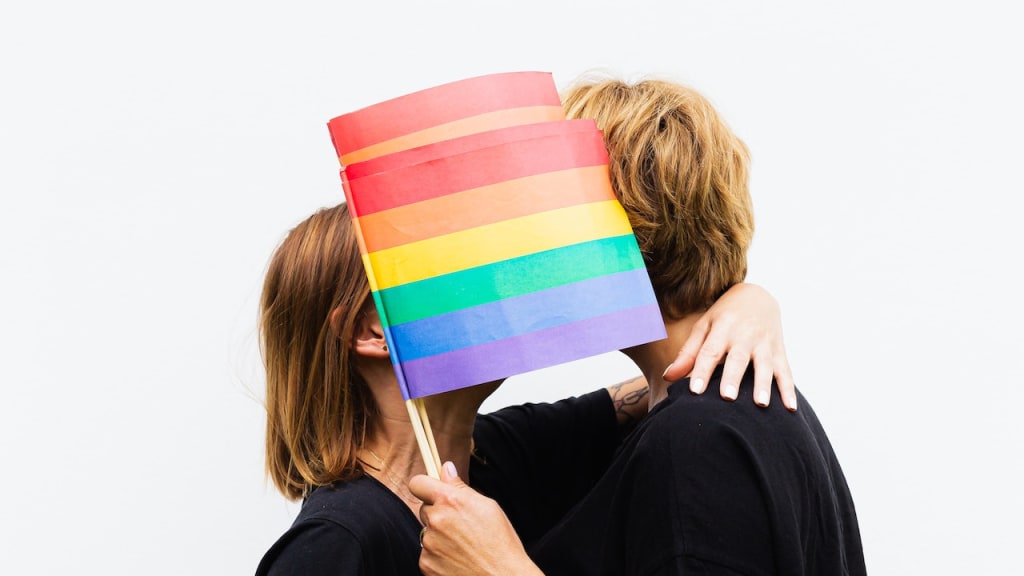Lesbian vs Hetero Relationship
The unique dynamics and perspectives of lesbian relationships compared to heterosexual relationships.

The unique dynamics and perspectives of lesbian relationships compared to heterosexual relationships.
Lesbian relationships have some unique dynamics and perspectives compared to heterosexual relationships, although many of the core aspects of relationships such as love, trust, communication, and commitment are similar. Here are a few ways that lesbian relationships may differ:
Gender roles: Traditional gender roles and expectations may not apply in the same way in lesbian relationships. For example, both partners may share household responsibilities, child-rearing, and breadwinning equally.
Stereotypes and discrimination: Lesbians may face social stigma, prejudice, and discrimination based on their sexual orientation. This can create additional challenges in their relationships and can impact their self-esteem and the quality of their relationships.
Coming out: Both partners in a lesbian relationship may have faced challenges related to coming out as gay or lesbian, which can impact their sense of self and their relationships.
Family and social support: Lesbians may not have the same level of support from their families or communities as heterosexual couples. This can impact their relationships and their sense of belonging.
Navigating intimacy: Intimacy in lesbian relationships may be different than in heterosexual relationships due to differences in anatomy, sexual orientation, and societal norms.
Overall, lesbian relationships, like all relationships, are unique and complex, shaped by a range of individual, relationship, and cultural factors. It's important to remember that despite the differences, the core aspects of relationships remain the same and that all relationships, regardless of the sexual orientation of the partners, require effort, communication, and commitment to thrive.
It's also important to note that despite these unique dynamics, lesbian relationships are just as diverse as any other type of relationship. No two relationships are exactly alike, and each lesbian relationship will have its own unique set of challenges and strengths.
Lesbian couples may also choose to define and express their relationship in different ways. Some may identify as monogamous, while others may be in open relationships. Some may choose to have children and start a family, while others may not. There is no one right way to be in a lesbian relationship, and what works best for one couple may not work for another.
Just like in any other type of relationship, communication is key in a lesbian relationship. Both partners should feel comfortable discussing their feelings, desires, and concerns, and should work together to resolve any issues that arise. Regular check-ins and a commitment to keeping the relationship strong can help ensure its longevity.
In conclusion, while there are unique dynamics and perspectives in lesbian relationships compared to heterosexual relationships, it's important to remember that all relationships require effort, communication, and commitment to thrive. By recognizing and embracing these differences, lesbian couples can build strong, fulfilling, and lasting relationships.
It's also important for lesbian couples to seek out support and resources when needed. This can include seeking counseling or therapy to work through challenges and enhance their relationship, as well as connecting with local LGBTQ+ organizations and support groups.
Additionally, it's important for lesbian couples to advocate for their rights and equality. This may involve advocating for marriage equality and other legal protections, as well as working to challenge and combat negative stereotypes and discrimination.
In summary, lesbian relationships are unique and have their own set of challenges and strengths. By embracing these differences, communicating effectively, seeking support when needed, and advocating for equality, lesbian couples can build strong, fulfilling, and lasting relationships. It's important to recognize and celebrate the diversity of relationships, regardless of sexual orientation, and to support all couples in their journey towards love and happiness.
It's also important for lesbian couples to prioritize self-care and self-love. This can involve setting aside time for themselves, engaging in activities that bring them joy and fulfillment, and taking care of their physical and mental health. When both partners are feeling happy, fulfilled, and at peace with themselves, this can have a positive impact on their relationship as a whole.
Additionally, it's important for lesbian couples to have a strong support system. This can include friends, family, and a wider community of LGBTQ+ individuals and allies. Having a supportive network can provide comfort, encouragement, and resources during times of need.
Finally, it's important for lesbian couples to recognize and celebrate their love and commitment. This can involve planning special events and celebrations to mark important milestones in their relationship, as well as taking time to reflect on the love and bond that they share.
In conclusion, lesbian relationships are dynamic and diverse, and by embracing their unique qualities, prioritizing self-care, building a strong support system, and celebrating their love and commitment, lesbian couples can build strong and fulfilling relationships that stand the test of time.
It's also important for lesbian couples to embrace diversity within the LGBTQ+ community. This includes recognizing and celebrating differences in race, ethnicity, religion, and gender identity, as well as acknowledging and combating intersectional forms of discrimination and oppression.
Additionally, it's important for lesbian couples to educate themselves and others about LGBTQ+ issues and to be vocal allies in the fight for equality. This can involve advocating for policies and laws that promote equality and inclusivity, as well as challenging harmful stereotypes and prejudices.
It's also important for lesbian couples to seek out representation in media and popular culture. This can involve seeking out books, movies, TV shows, and other media that accurately and positively depict LGBTQ+ individuals and relationships. Representation is important for promoting visibility and normalization, as well as helping to counteract negative stereotypes.
Finally, it's important for lesbian couples to recognize the impact of societal norms and expectations on their relationships. This may involve challenging traditional ideas about gender roles and relationships, as well as working to create a world where all types of relationships are valued and respected.
In conclusion, by embracing diversity, advocating for equality, seeking representation, and challenging societal norms, lesbian couples can work to build a world that is more inclusive and supportive of all types of relationships.
In conclusion, lesbian relationships are unique and dynamic, and come with their own set of challenges and strengths. By prioritizing self-care, communication, support, celebration, embracing diversity, advocating for equality, seeking representation, and challenging societal norms, lesbian couples can build strong, fulfilling, and lasting relationships. It's important to recognize and celebrate the diversity of relationships and to support all couples in their journey towards love and happiness.
About the Creator
Santhosh Ramesh
An eccedentesiast human who was loving to create contents and journaling.
Consider subscribe me for more contents.






Comments
There are no comments for this story
Be the first to respond and start the conversation.